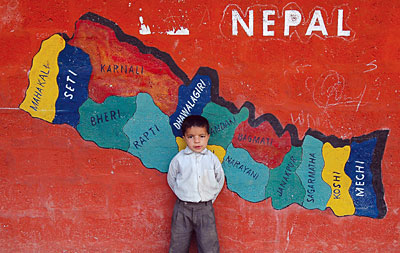 DEEPENDRA BAJRACHARYA |
We discuss our politics endlessly, in living rooms, at wedding parties, in teashops. In Jaipur, too. Last year's participants at the Jaipur Literature Festival complained that Nepal was not included in a session on the subcontinent. This year, Manjushree Thapa, Narayan Wagle, and Sujeev Shakya were invited to several panels, including 'Fractious Borders: The Ups and Downs of Himalayan Relationships' and 'Nepal Öin Search of a Song'.
The former session, meant to have featured speakers from Bhutan and Afghanistan, was pared down by circumstance, allowing Wagle and Shakya to spar with Nirupama Rao, the Indian Foreign Secretary who had just flown in from a Nepal visit herself. What followed, within the confines of what Rao could actually say, was sometimes spiky.
Shakya focused on the economic aspects of the relationship, emphasising the future of economic integration with India. As expected, Wagle was more political. His characterisation of Nepal as India-locked (while underlining the age-old bonds between the two countries) immediately put Rao on the defensive, prompting her to suggest that 'India holds the key'. This was taken up by one of the audience members, who declared that all South Asian states needed a 'master key'.
Rao explained that she hadn't meant India held the key for the entire region, but with a combative audience by no means sympathetic to the idea of India as hegemon, she was walking in a minefield. Nonetheless, she assured the Nepalis present that there were no plans afoot to fence the border. Wagle had earlier noted that in the wake of the Mumbai attacks, had there been evidence that a single terrorist had crossed over from Nepal, this would have been the Indian response. The open border would remain open, Rao confirmed. Better management of this border would, however, be key.
Rao also suggested that South Asia had to grow up (as Europe did, through much strife, from the 19th century on) and restore the radial connections with Southeast Asia that have been snapped of late. India, she said, only wished the best for its neighbours, this being in its own interest. Of course, such a statement from the Foreign Secretary, uttered at a literature festival, amount to a hill of beans in the face of all the grievances India's neighbours would cite.
This week, Nepal's president is on a low-key visit to India. It is an opportunity lost that he wasn't deemed important enough to be at the Republic Day function in New Delhi. Despite his ceremonial role as head of state, Ram Baran Yadav's visit can still be put to use to correct imbalances in our asymmetric relationship by building trust and lift bilateral relations from one based on emotional gut-reaction to more stable ties founded on mutual respect. Nepal's overwhelming economic and political dependence on India is not in India's national interest, either. Nepali politicians, too, have to rise above knee-jerk nationalism and stop playing reckless brinkmanship that ends up harming our own interests. The real question is not what degree of influence India has on our politics, it is what we are going to do about a moribund economy that isn't able to create jobs for our citizens, million of whom have to escape to India for employment.
In Jaipur, the audience once more reminded the panelists that they had neglected to even speak of China, whose policies determine India's reactive ones. Perhaps India also needs to grow up.
READ ALSO:
The politics of the economy, PRASHANT JHA


